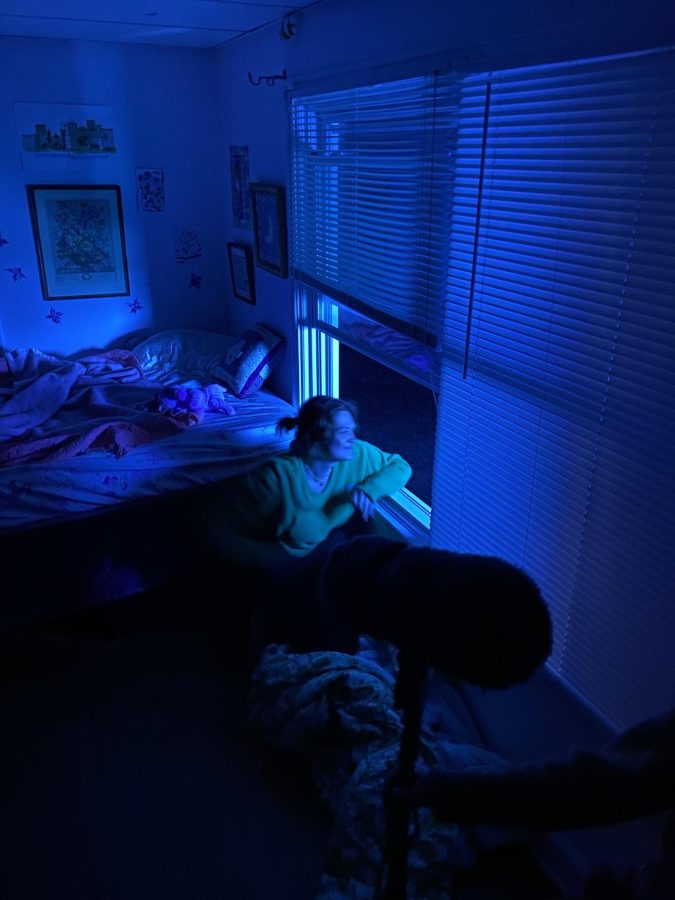Cinema Studies Seniors Collaborate on Final Films
College fourth-year Katie Homer-Drummond directs a gaffing team from outside their window while shooting for their film project, Wolf Girl.
After a six-year absence of capstone opportunities for seniors, 12 students in the Cinema Studies department will debut films through the Advanced Film Making Projects course to culminate their film careers at Oberlin. These films define a college career of making and learning for these students and symbolize a “wrap” on their time at Oberlin.
In 2016, in the face of understaffing and lack of resources, the Cinema Studies department cut its support for senior capstones from the program. Since then, fourth-years in the major have faced obstacles in creating a thesis film. While they were able to do so via private reading with a professor, the small number of Oberlin professors working in film production and their limited bandwidth greatly restricted the number of students who could create a final film for course credit. This semester, a course substituting the role of senior capstone, Advanced Film Making Projects, has allowed 12 students to pursue creating their own work.
College third-year Alba Robledo Díaz is an exception to the typical fourth-year profile of the course. She is taking the course as what she dubs a “dupe” for a capstone, as she prepares to graduate early this fall.
“It’s like a collective private reading with [Professor of Cinema Studies] Rian Brown-Orso,” she said. “It functions like that, so we have a scheduled meeting time, but it’s more about: we meet together, we talk about what we are all going to do and where we are standing with our projects. Sometimes we have individual consultations. When we have our meetings together, Rian has the class designed so it really feels like you are in a professional setting; you have to pitch your project to everyone.”
For some students, like College fourth-year Katie Homer-Drummond, the course is an opportunity to realize an already-prepared script and pursue a final reification of themes they’ve explored throughout their Oberlin career.
“I wanted to do a horror piece for my final, and I wanted to do something that plays around with triptychs and the idea of threes,” they said of their film, Wolf Girl. “There’s these three different sections that are in three different styles, and there’s a piece of music that is used in a lot of different ways. I started outlining it in detail in the fall and writing out a proto-script, scripted it over Winter Term, and finalized everything and started to get the team together. It became more solidly about a theme, which ended up being the horror of puberty in young girls, especially coupled with body trauma or medical trauma.”
College fourth-year Chris Schmucki took a different route with his project. He is creating what he describes as an experimental piece, involving painting on celluloid and mingling with freeform jazz music he commissioned from Conservatory students.
“It’s almost like a dance film,” he said. “It’s very different from what I’m used to doing — I’ve done a lot of documentary and narrative stuff. I’m using this class as an opportunity to do something more personal and experimental.”
For fourth-years like Schmucki, the emergence of the class was a stroke of luck — not every generation of Cinema Studies fourth-years has had the opportunity to make a culminating final film.
“They haven’t offered this course since spring of my freshman year,” he said. “I was able to work on a film my freshman year for someone who was taking this class, so now it feels like a full-circle moment.”
College fourth-year Julia McCormick, who is co-directing the film Kevin’s Party, noted that the course is helping challenge the major’s fundamental problem — the lack of a senior capstone.
“There’s always a question with the Cinema Studies major of, ‘Why doesn’t it culminate in anything?’ That’s something I’ve been wondering,” she said. “I guess this felt like a final course to pursue a bigger project, but it has been a little difficult with everyone in the class pursuing a project at the same time. I think a little bit more organization with the major would have been better, so that people could have a capstone, but maybe in the first semester instead of all in the second semester.”
College fourth-year Amelia Connelly, writer and co-director of Kevin’s Party alongside McCormick, noted that the course also helps to remedy a lack of intimacy across the Cinema Studies department.
“I feel like that goes back to what Julia was saying, about there not being a closeness or intimacy in the department,” she said. “I don’t think that’s anybody’s fault; I think that’s the pandemic.”
This feeling is one felt almost universally across the class of 2022. Some, like McCormick and Connelly, feel robbed of the chance for greater training in film production, as they were sent home during their second-year spring, when production knowledge usually is first being taught.
“We feel more scrambled than we maybe would if we had had more training in production, but also if the department was more intimate, so that we knew what other courses were being taken, we could get help from people who are learning those fundamentals,” McCormick said. “It’s also a bittersweet feeling, because just when I had an opportunity to work on a film in my sophomore year, we were sent home.”
However, some filmmakers have noticed the course allows an opportunity to remedy the lack of intimacy in the department. Schmucki, who works as a director of photography for two projects in addition to his own, emphasized the role of these films and the large crews they require as a community building experience.
“As much as it is about the films, it’s about the people you meet, and those connections you get to make,” he said. “I think I’ve learned a lot in classes about filmmaking, but I think I appreciate films like this class, because you’re doing the work, you’re literally making films and learning through that process.”
The Cinema Studies department will host screenings of the projects that are open to the public in Dye Lecture Hall on May 30.









